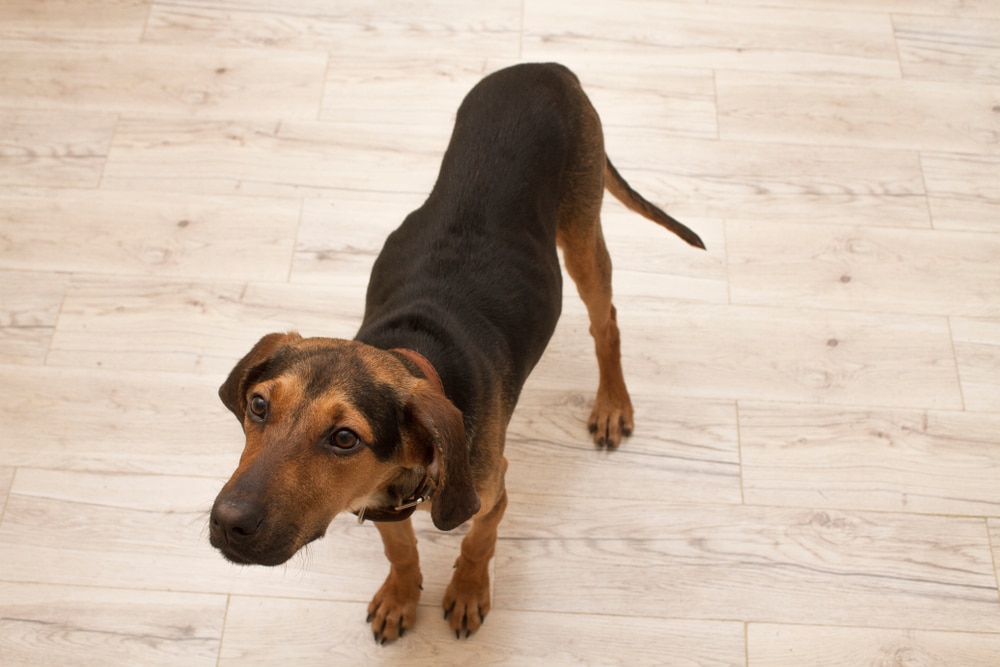When it comes to dog health, pet owners should be especially mindful of their dog’s weight. Underweight dogs have the potential to suffer from several medical issues, so what are some causes and risks associated with this condition? What happens when a dog is underweight?
Underweight dogs face serious health risks. Poor coat and skin conditions, muscle wasting, lack of energy, weakened immunity, and organ failure are all possible consequences. Other issues, such as reduced fertility, delayed wound healing, and increased vulnerability to infections, may also occur.
Table of Contents
What Are The Dangers Of An Underweight Dog?
Underweight dogs can suffer various health issues, some serious. It is important to understand the potential dangers associated with an underweight dog to protect your dog’s well-being.
Poor Immune System
The danger of being underweight in dogs is a weakened immune system, as vital organs can suffer from a lack of nutrition. This compromises their immunity and leaves them susceptible to illnesses and slow recovery. An overall lack of energy further hampers their ability to fight infections.
Digestive Issues
Underweight dogs are susceptible to digestive issues such as IBD (inflammatory bowel disease) and pancreatitis, which can cause nausea, vomiting, diarrhea, and decreased appetite. Without adequate nutrition, including proteins and vitamins, digestion can worsen.
Low Energy Level
An underweight dog may have a lack of energy due to missing essential nutrients and calories. Without proper nutrition, they can’t participate in activities like exercise or playtime as normal. Low energy levels can also lead to depression and anxiety. Owners must ensure their dog is receiving the proper nutrition for top health and vigor. Proper nourishment is essential for dog well-being.
Loss Of Muscle Mass
An underweight dog can suffer from decreased energy levels, but that’s only the beginning. Without proper nutrition and exercise, your pet may also experience a loss of muscle mass, hindering its strength and agility. Furthermore, this could lead to joint pain as well as vulnerability to injury due to weakened joints.
Skin And Coat Problems
Unhealthy fur and skin are common signs a dog may be missing vital nutrients, such as essential fatty acids. The coat can become brittle or matted while the skin is dry, flaky, and itchy. In some cases, bald patches on the body could suggest an underlying health issue like metabolic disorders or parasites as well.
Organ Dysfunction/Damage
When an underweight dog’s organs lack essential nutrients, it can suffer from severe issues such as liver and kidney failure. Furthermore, even an organ that’s crucial for survival, like the heart, can be endangered when malnourishment occurs.
What Are The Causes Of Dogs Being Underweight?

Understanding the causes of a dog’s underweight state is crucial for providing your pet with the right nutrition and care. There may be several factors impacting why a dog might be underweight.
Poor Nutrition
Poor nutrition is a common cause of dogs being underweight. They may not be consuming a nutritionally balanced diet, or the portions they are eating could be inadequate. Whatever the cause, it’s clear that their nutrition is lacking. Incorrect feeding schedules and processes can also lead to your pet becoming underweight.
Intestinal Parasites
Intestinal parasites are another potential cause of a dog being underweight. These can compete with the dog’s body for nutrients, leading to malnutrition and weight loss. Common intestinal parasites include roundworms, tapeworms, whipworms, and hookworms.
Bacterial Or Viral Infections
Bacterial and viral infections can also lead to weight loss in dogs. Infections such as parvovirus and distemper can cause a dog’s appetite to decrease while simultaneously draining its energy levels, leading to weight loss.
Medical Conditions
Diseases such as diabetes, Cushing’s, cancer, and thyroid can all cause reduced appetite and weight loss. It’s essential to diagnose and treat these conditions swiftly for your pet’s well-being.
Stress Or Anxiety
Stress or anxiety can also be a factor in a dog becoming underweight. If a pet is experiencing intense stress or anxiety, its appetite may decrease, leading to weight loss. It’s important to identify the source of your pet’s stress and take steps to reduce it if possible.
Weakened Immune System
The body has to focus its energies on fighting off illnesses instead of using them for normal bodily functions such as digestion. If your pet lacks proper nutrition and care, its immune system can become weakened, making it prone to becoming underweight.
Poor Environment
Insufficient access to shelter, food, and water can cause malnutrition and weight loss. Additionally, exposure to environmental toxins and other hazards could further weaken your pet’s health and cause it to lose weight.
Why Is My Dog Losing Weight But Still Eating?
Weight loss in dogs can be both a natural and an alarming process. If your pup is eating normally but still losing weight, it could be due to either metabolic or behavioral factors.
Metabolic causes for weight loss include:
- Kidney disease
- Diabetes mellitus
- Kidney or thyroid disease
- Certain types of cancer
- Parasites
Behavioral causes of weight loss in dogs can include:
- Stress
- Changes in their environment
- Dietary changes
What Can I Give My Dog To Gain Weight?
Dogs can become underweight for a variety of reasons. Healthily gaining weight is important to ensure your pup stays healthy and happy. Helping your pup gain weight can be done in several ways. Consider which one works best for you and your pet:
- Start with a balanced, nutrient-rich diet formulated specifically for adult dogs or puppies, depending on your pet’s age. Ensure your pet’s well-being by providing fresh water and the right type of food.
- If your dog still needs to gain weight, you can consider supplements or adding extra fat and calories to their regular meals.
- Adding a tablespoon of canned pumpkin or shredded carrots help increase caloric intake without overloading the digestive system.
- If your pet is already eating a complete and balanced food, try adding some wet food to the mix. This can provide more taste and texture variety, encouraging them to eat more food.
- Treat your pup to a high-calorie snack. Think cooked hamburgers, chicken (no bones!), cheese, peanut butter, eggs, yogurt, or cottage cheese. Just remember that it’s important to only give these treats in moderation.
- Make sure your pup is getting plenty of exercise to build muscle and keep its metabolism going. Exercising regularly with activities like swimming, walking, jogging, and playing fetch can help keep your dog at a healthy weight as well.
In Conclusion: What Happens If A Dog Is Underweight?
If you observe your canine’s weight decreasing, it may indicate potential health problems; thus, prompt action is necessary. Your veterinarian can offer advice on how to achieve a healthy weight for your pup and treat any existing medical issues. Offering adequate nutrition, reducing stress levels with activities such as playtime or mental stimulation toys, and providing suitable exercise are all practicable methods to help increase your dog’s body weight.
Are you worried about your dog being underweight? Have you had any experience with this in the past? Let us know in the comments below!
